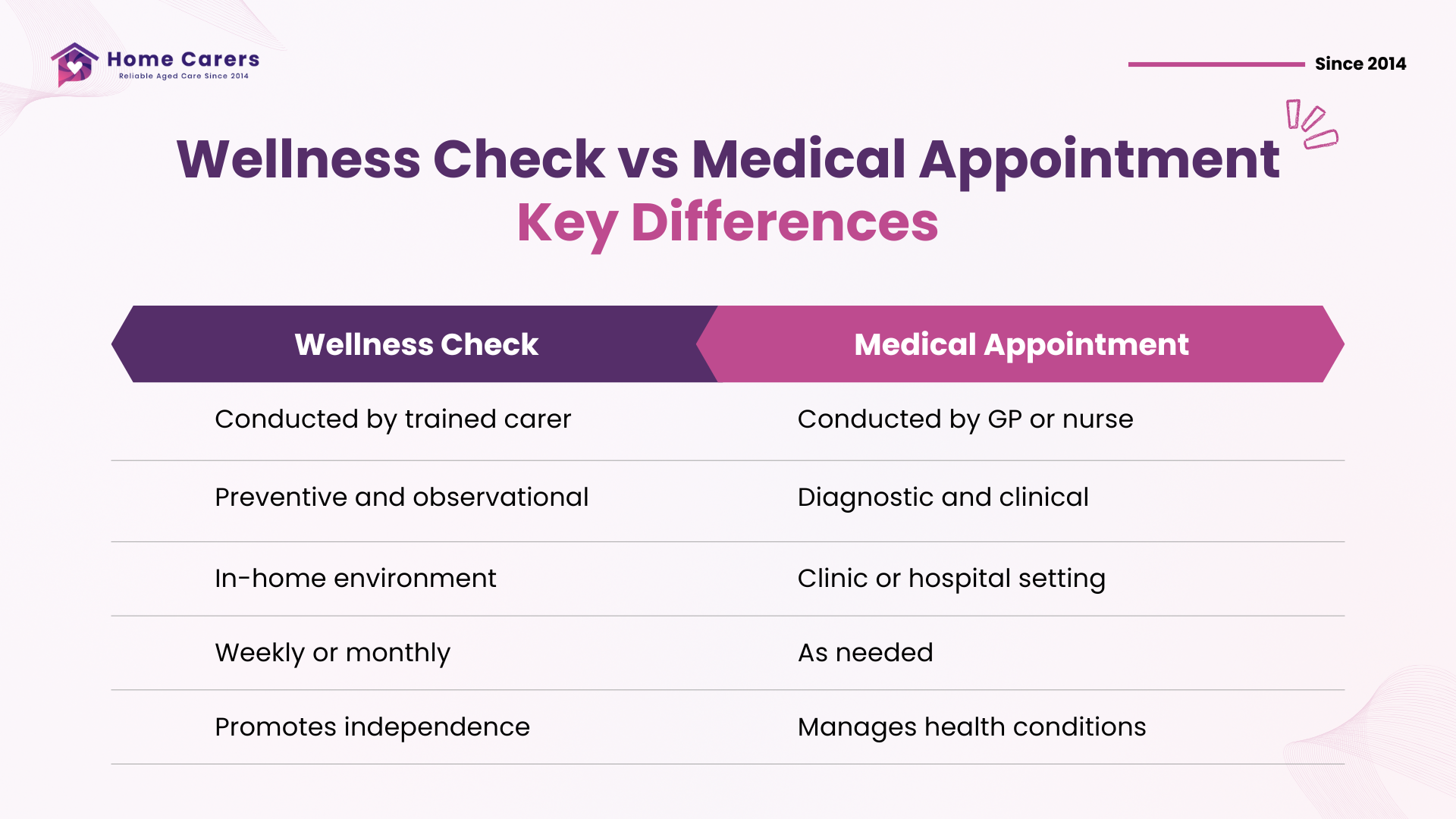.
When families first hear about wellness checks for older people in New Zealand, it’s common to wonder how they differ from medical appointments. Aren’t both about health?
In short — yes, but they serve different roles.
Medical appointments focus on diagnosis and treatment.
Wellness checks focus on observation, prevention, and everyday support.
Together, these two forms of care create a complete picture of wellbeing — one that helps older people stay healthy, confident, and independent at home.
Understanding the Key Difference
1. Medical Appointment
A Medical appointment takes place in a clinical setting and is led by a GP, nurse, or specialist. It focuses on identifying and treating specific health conditions, supported by tests, prescriptions, and formal assessments.
2. Wellness Check
A wellness check, however, happens in the home — the environment where daily health habits and small challenges are most visible. Conducted by trained carers, these visits are personal, relaxed, and preventive.
Carers observe the things a doctor might not see in a short consultation:
- How easily someone moves around their home
- Whether they’re eating well or staying hydrated
- How their mood and memory are day to day
- Whether the home itself feels safe and manageable
The Ministry of Health notes that early, community-based intervention plays a key role in reducing hospital admissions and improving independence for older adults. That’s exactly what wellness checks provide: a bridge between clinical care and daily living.
What’s Included in a Home Wellness Check
At Home Carers, each wellness check for older people in NZ includes gentle, structured support focused on wellbeing rather than treatment.
Carers typically look for four key areas of daily health:
- Home Safety and Comfort — Ensuring the home is tidy, well-lit, and hazard-free to prevent falls or accidents.
- Routine and Medication Reminders — Helping clients stay on track with their daily schedule, medication, and hydration.
- Basic Health Observations — Noting subtle changes in mobility, appetite, energy, or mood that may require attention.
- Emotional Connection and Family Updates — Providing companionship, conversation, and real-time updates to families after each visit.
These visits are not clinical or invasive. They’re warm, observational, and designed to help older people stay well between doctor’s visits.
👉 Learn more about our wellness checks service
When to Book a Medical Appointment Instead

While carers play a preventive role, they are also trained to recognise when professional medical attention is needed. Families should book a doctor’s appointment if they notice:
- Persistent pain, coughing, or fever
- Significant weight loss or appetite changes
- Sudden confusion or disorientation
- Repeated falls or fainting spells
- Unexplained swelling or skin changes
Carers are skilled at identifying and reporting these symptoms promptly, ensuring families act early rather than waiting until an emergency arises.
This partnership between home-based carers and GPs creates an efficient care network — one that’s responsive, well-informed, and personalised.
Why Both Are Equally Important?
It’s not a question of either/or — wellness checks and medical appointments complement one another.
Together, they form a continuum of care that keeps older people healthy and connected.

By combining both types of care, families can ensure that older loved ones receive ongoing support between formal medical checkups — making small problems less likely to grow into major health events.
Bridging the Gap Between Medical and Everyday Care
Many older people may only see their GP every few months. In between, a wellness check acts as a safety net — ensuring someone is keeping a close eye on daily wellbeing.
A carer can notice early changes that signal it’s time for a doctor’s visit. For example:
- A gradual loss of appetite may indicate medication side effects.
- Increased fatigue might signal low hydration or a developing infection.
- Forgetfulness could point to medication mismanagement or cognitive decline.
These are small but vital observations. By sharing them early, carers help families and doctors take timely action.
Families who use both types of care (clinical and in-home) often report fewer hospitalisations and smoother long-term health outcomes.
Working Together for Better Health
When wellness checks and medical care work hand-in-hand, older New Zealanders enjoy a stronger safety net.
Carers notice the everyday details; doctors handle the complex ones. Together, they help families prevent emergencies and maintain independence.
Real care isn’t just about treating illness — it’s about noticing change, sharing insight, and supporting life at home.


